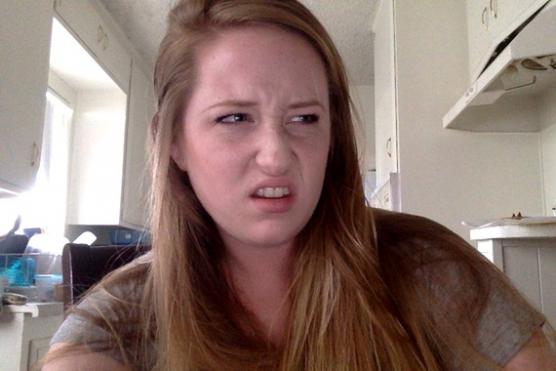On Valentines' Day, I was walking on campus with a friend when a complete stranger approached us and said, "I'm going up to girls that I find sexually attractive and asking them for their phone numbers."
He turned to me and said, "Sorry if this is painful for you."
My response:
DID ANYONE ASK FOR YOUR OPINION?
So, on that note, this one is for you, sir. I've spent ostensibly precious time in my busy day as a part-time student, full-time Netflix binger, to deliver you a letter on why your "clever" scheme didn't work.
Here goes.
No, I was not offended that you did not find me attractive, because my value is not determined by how attractive you find me. You do not get to decide what offends me -- I decide my own value.
After that experience I got to thinking about other people and places that have negatively influenced my perception of myself -- and I've come to several realizations.
My body shape does not define my value.
Women today live in a world where societal expectations and body expectations permeate all aspects of mass media. In a modern world, women are expected not to only follow a single ideal body expectation, but multiple. In a world of Glamour and Victoria's Secret, we're expected to have the breasts of Kate Upton, the butt of Jennifer Lopez, while maintaining the waistline of Mary Kate Olsen.
Tina Fey summed it up in her bestselling memoir, Bossypants, where she examines the unrealistic body expectations placed upon females today.
Fey said,
"Now every girl is expected to have Caucasian blue eyes, full Spanish lips, a classic button nose, hairless Asian skin with a California tan, a Jamaican dance hall ass, long Swedish legs, small Japanese feet, the abs of a lesbian gym owner, the hips of a nine-year-old boy, the arms of Michelle Obama, and doll tits."
Hard as we may try, this blinding reality is hard to ignore, much less disregard.
In her 2010 documentary Killing Us Softly 4 Jean Kilbourne examines depictions of women in advertisements and mass media. Analyzing hundreds of commercial ads, Kilbourne stated, "[The body type] that we see as acceptable or desirable is one that fewer than five percent of American women have."
Often times, women are expected to look like the models in advertisements--and companies like Victoria's Secret sustain these toxic expectations.
Victoria's Secret recently ran into some controversy when they unveiled their newest campaign, "The Perfect Body." They changed the campaign name to "A Body For Every Body" but while walking around a Victoria's Secret I noticed that the advertisement definitely didn't represent "every body."
In what way by any stretch of imagination does this campaign represent "every body?"
And the incorrect appropriation of the self-love message can come from feminist icons perceived to be chief in elevating women's worth. Meghan Trainor's "All About That Bass," -- as catchy as it may be -- is just as harmful. Each body type should be embraced and celebrated -- not shamed.
Trainor shames who she refers to as, "skinny bitches" and sings about how boys prefer "a little more booty to hold at night." But, why should any female's body be based around male preference? Why does Trainor relegate our self-worth to what men want? Base it around how you feel most comfortable.
My self-worth is not tied to the amount of sexual desire someone attributes to me.
One of the biggest problems I had with this winter's teen hit movie The Duff, was that it presented the idea that if a woman wants respect, she must improve her physical appearance to better suit the needs of a patriarchal culture.
In case you didn't know, the acronym "D.U.F.F." stands for "Designated Ugly Fat Friend," and I have to say, it's cringe-worthy to even type. According to the film, the purpose of the "duff" is to make the other friends comparatively more attractive.
The concept of the Duff perpetuates the idea that women are judged first and foremost by their bodies and what others think of them.
"Loving yourself because dudes like what you've got going on is a pretty flimsy form of self-acceptance," said Feministing writer Chloe Angyal. "In fact, it's not really self-acceptance at all if it depends on other people thinking you're hot."
While there were many things I would've liked to say to that guy on Valentine's Day (screw you, who do you think you are?), I think the most important thing was what I didn't say. The important thing was the realization I came to.
The rejection that he tried to place upon me, how he tried to belittle me -- none of it worked, because my self-worth and my value is not measured by the amount of sexual desire attributed to me.
Motivational speaker Mike Robbins wrote, "Our true value has nothing to do with any of these external factors. At the deepest level, we're valuable as human beings just because we're us -- not because of what we do, how we look, what people think of us, or what we produce or accomplish."
My value is not based on my ability to look like a photo-shopped advertisement, nor is it based on rejection, or sex appeal.
My worth is not in the hands of other's opinions, perceptions, and judgments. So while there's nothing wrong with a desire for others to find me attractive, I'm not going to let it hold me back and hurt me when they don't.
My worth is in my own hands. And whether I build it or break it is up to me.
















